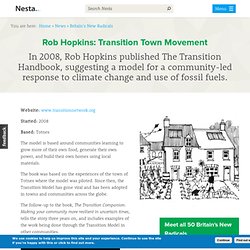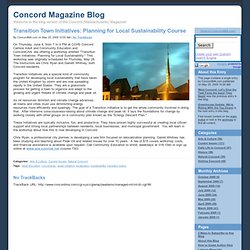

Catalyzing a Resilient Communities Network. This Catalyzing a Resilient Communities Network Pre-Bioneers Conference Event, October 18th, San Rafael, CA, was a landmark gathering featured leading models, strategies and tools for building resilience at the community, local and regional levels, highlighting the opportunity for a Resilient Communities Network nationally and globally.

The event, co-Sponsored by the Thriving Resilient Communities Co-laboratory (of which Transition US is a team member) and the Threshold Foundation, was attended by over 200 community leaders from various parts of the U.S. and beyond. The event was framed in this way: The science says we have physically entered a period of great change, a synchronized, related crash of the economy and ecosystem. Rob Hopkins: Transition Town Movement - Britain's 50 New Radicals - NESTA. Website: www.transitionnetwork.org Started: 2008 Based: Totnes The model is based around communities learning to grow more of their own food, generate their own power, and build their own homes using local materials.

The book was based on the experiences of the town of Totnes where the model was piloted. Transition Town Initiatives: Planning for Local Sustainability Course - Concord Magazine Blog. On Thursday, June 4, from 7 to 9 PM at CCHS Concord Carlisle Adult and Community Education and ConcordCAN are offering a workshop entitled "Transition Town Initiatives: Planning for Local Sustainability.

" This workshop was originally scheduled for Thursday, May 28. The instructors are Chris Ryan and Garrett Whitney, both Concord residents. Transition Initiatives are a special kind of community program for developing local sustainability that have taken the United Kingdom by storm and are now spreading rapidly in the United States. They are a grassroots process for getting a town to organize and adapt to the growing and urgent threats of climate change and peak oil. As oil resources diminish and climate change advances, all towns and cities must use diminishing energy resources more efficiently and sparingly.